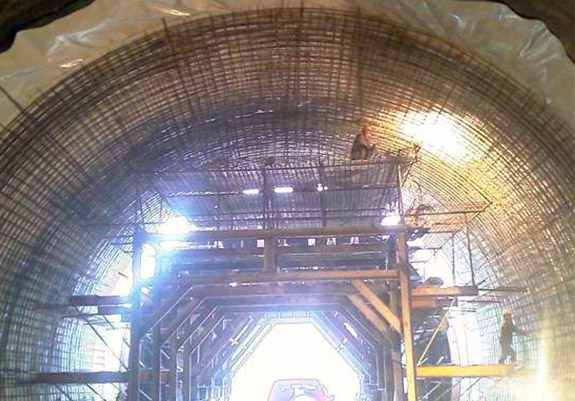Steel reinforcement mesh plays a crucial role in strengthening concrete structures, ensuring that they can withstand high loads, resist cracking, and last longer. It is commonly used in the construction of foundations, floors, pavements, and various other concrete applications. When it comes to selecting the strongest steel reinforcement mesh for your project, it’s important to understand the materials, types, and properties that contribute to its strength and performance. In this article, we'll explore the factors that define the strongest steel reinforcement mesh and highlight the best options available for different construction needs.
1. What is Steel Reinforcement Mesh?
Steel reinforcement mesh, often referred to as welded wire mesh (WWM) or reinforcing mesh, consists of a network of steel bars or wires arranged in a grid-like pattern. This mesh is embedded in concrete to provide tensile strength, preventing cracks and enhancing the overall durability of the structure. The mesh is typically made from high-quality steel wires that are welded at each intersection, forming a robust and uniform grid.
There are different types of reinforcement mesh, including plain steel mesh, galvanized mesh (for corrosion resistance), and stainless steel mesh (used in more specialized applications). The strength of the mesh depends on factors like the wire diameter, spacing between the wires, and the material used in production.

Tunnel Linings
2. Key Factors That Influence Mesh Strength
The strength of a steel reinforcement mesh is determined by several factors, each contributing to its overall performance in reinforcing concrete:
2.1. Material Quality
The material used to make the mesh is a crucial factor in determining its strength. The two most common materials used in reinforcement mesh are:
Carbon Steel: The most widely used material for reinforcement mesh. Carbon steel is strong, cost-effective, and durable, but it is prone to rust and corrosion over time.
Galvanized Steel: Galvanized steel mesh has been coated with a layer of zinc, offering greater protection against corrosion. It is ideal for outdoor or humid environments, where corrosion resistance is critical.
Stainless Steel: Stainless steel reinforcement mesh offers the highest resistance to corrosion and is used in applications where exposure to aggressive chemicals or high humidity is common. Stainless steel meshes are the strongest in terms of durability and longevity but tend to be more expensive.
2.2. Wire Diameter
The thickness or diameter of the wires used in the mesh directly impacts its strength. Thicker wires provide greater tensile strength and are more capable of withstanding higher loads without failure. When selecting reinforcement mesh, it's important to consider the type of concrete structure being built and the required load-bearing capacity to determine the appropriate wire diameter.
2.3. Wire Spacing
The spacing between the wires (also referred to as mesh size or opening size) affects the overall reinforcement strength of the mesh. Smaller spacing between wires ensures that the mesh can better resist cracks and deformation, as the smaller openings offer more support to the concrete. However, closer spacing also increases the cost of the mesh, so a balance must be found based on the structural requirements of the project.
2.4. Weld Strength
The weld strength at the intersections of the steel wires is a key factor in ensuring the overall strength of the mesh. High-quality welded intersections are essential for maintaining the mesh's structural integrity and preventing the wires from separating under stress. The stronger the weld, the more durable and reliable the mesh will be in reinforcing the concrete.
2.5. Surface Finish
The surface finish of the steel reinforcement mesh can impact its corrosion resistance and bonding ability with concrete. For example, galvanized mesh provides extra protection against rust, while mesh with a smooth surface finish might have better bonding characteristics with concrete, leading to stronger adhesion.
3. Types of Steel Reinforcement Mesh for Maximum Strength
Several types of steel reinforcement mesh are available, each with unique properties that contribute to its strength and suitability for specific applications:
3.1. High Tensile Welded Wire Mesh
High tensile welded wire mesh is one of the strongest types of steel reinforcement mesh. This mesh is made from high-strength steel wires that are specifically designed to handle high tensile loads, making it ideal for heavy-duty concrete applications. It is commonly used in industrial buildings, highways, and other large-scale infrastructure projects where superior strength is required.
3.2. Galvanized Welded Wire Mesh
Galvanized steel mesh is coated with a layer of zinc to protect it from corrosion, making it particularly useful in outdoor or moisture-prone environments. The galvanized coating enhances the strength of the mesh, offering both durability and resistance to rust. This type of mesh is widely used in the construction of pavements, foundations, and other concrete structures exposed to weather conditions.
3.3. Stainless Steel Reinforcement Mesh
Stainless steel reinforcement mesh offers the highest strength and corrosion resistance among all types of reinforcement mesh. It is particularly suited for applications that require long-term durability, such as marine structures, chemical plants, and sewage systems. Although more expensive, stainless steel mesh is often the preferred choice for critical applications where environmental conditions might otherwise cause corrosion of carbon steel meshes.
3.4. Fiber-Reinforced Mesh
Fiber-reinforced steel mesh combines the strength of steel with the added flexibility of synthetic fibers like glass or carbon. While not as strong as pure steel mesh, fiber-reinforced mesh offers better crack resistance and is used in applications where flexibility and impact resistance are more important than sheer tensile strength. This mesh is commonly used for flooring, pavements, and residential concrete applications.
4. The Strongest Steel Reinforcement Mesh: A Recommendation
The strongest steel reinforcement mesh for most construction applications is **high tensile welded wire mesh** made from high-quality carbon steel or stainless steel. This mesh is designed to withstand heavy loads and provide the maximum strength and durability needed for demanding projects like commercial buildings, bridges, and highways.
If you are working on a project where corrosion resistance is crucial, **galvanized welded wire mesh** or **stainless steel mesh** are excellent options. Both offer superior protection against rust and environmental damage, making them ideal for outdoor or moisture-exposed applications.
Ultimately, the choice of reinforcement mesh depends on your specific project needs, including load-bearing requirements, environmental conditions, and budget constraints. However, for high strength and reliability, high tensile welded wire mesh remains the best option for most construction applications.
5. Conclusion
Steel reinforcement mesh plays a vital role in the strength and longevity of concrete structures. The strongest steel reinforcement mesh will depend on factors such as the material, wire diameter, weld strength, and mesh spacing. High tensile welded wire mesh made from carbon steel or stainless steel is generally the strongest and most reliable choice for demanding construction projects. For environments prone to corrosion, galvanized or stainless steel mesh offers added durability. Understanding these factors will help ensure that the right reinforcement mesh is selected for your project, ultimately contributing to the safety, stability, and longevity of the structure.







